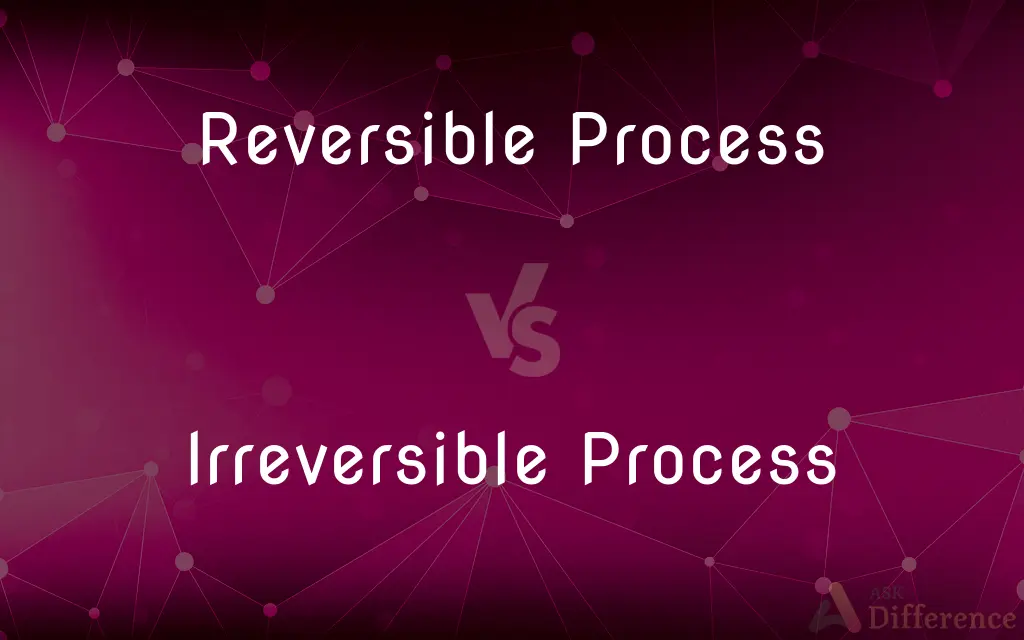Reversible Process vs. Irreversible Process — What's the Difference?
By Tayyaba Rehman — Published on January 17, 2024
A reversible process is a theoretical concept where a system can return to its initial state without any net changes, while an irreversible process results in permanent changes that cannot be undone.

Difference Between Reversible Process and Irreversible Process
Table of Contents
ADVERTISEMENT
Key Differences
A Reversible Process can theoretically be reversed, leaving no change in the system. An Irreversible Process causes permanent changes in the system that can't be undone.
In a Reversible Process, the system remains in equilibrium at all stages. In an Irreversible Process, the system moves away from equilibrium during the process.
Reversible Processes are idealized and rare in nature. Irreversible Processes are common in everyday phenomena.
Reversible Processes involve no entropy generation. Irreversible Processes generate entropy, indicating energy dispersal.
Reversible Processes assume no energy loss. Irreversible Processes include real-world factors like friction and heat loss.
ADVERTISEMENT
Comparison Chart
Nature of Process
Theoretically reversible, leaves no change in the system
Causes permanent changes, can’t be reversed
System Equilibrium
Remains in equilibrium at all stages
Moves away from equilibrium during process
Occurrence
Idealized and rare in nature
Common in everyday phenomena
Entropy Generation
No entropy generation
Generates entropy, indicating energy dispersal
Energy Loss
Assumes no energy loss
Includes real-world factors like friction, heat loss
Compare with Definitions
Reversible Process
Theoretical process leaving no system change.
A perfectly elastic collision is a Reversible Process.
Irreversible Process
Process causing permanent system changes.
Mixing of two gases is an Irreversible Process.
Reversible Process
Maintains system equilibrium throughout.
Quasistatic expansion in thermodynamics is a Reversible Process.
Irreversible Process
Leads to system disequilibrium.
Spontaneous chemical reactions are an Irreversible Process.
Reversible Process
Theoretical, involves no entropy generation.
Magnetic field changes in a superconductor are a Reversible Process.
Irreversible Process
Process that can’t be reversed without energy input.
A natural decay process is typically an Irreversible Process.
Reversible Process
Process that can be reversed without energy loss.
An idealized piston compression is a Reversible Process.
Irreversible Process
Common, real-world process with energy dissipation.
Burning fuel in an engine is an Irreversible Process.
Reversible Process
Idealized process with reversible changes.
In theory, an isothermal expansion can be a Reversible Process.
Irreversible Process
Generates entropy, indicating energy loss.
Friction causing heat loss is an Irreversible Process.
Common Curiosities
What is an Irreversible Process?
It's a process that causes permanent changes and can't be reversed without additional energy.
Does a Reversible Process generate entropy?
No, it involves no entropy generation.
Are Reversible Processes common in nature?
No, they are idealized and rare in real-world scenarios.
Can a Reversible Process be achieved in practice?
It's mostly theoretical; real-world processes are not perfectly reversible.
Do Reversible Processes assume energy loss?
No, they assume no energy loss.
Are Irreversible Processes common in nature?
Yes, they are common in everyday phenomena.
Do Irreversible Processes include energy loss?
Yes, they often include factors like friction and heat loss.
What is a Reversible Process?
It's a theoretical process that can be reversed without changing the system.
Is a Reversible Process realistic in engineering?
It's used as an idealized model, but real processes are not perfectly reversible.
Is boiling water a Reversible or Irreversible Process?
It's considered an Irreversible Process due to energy changes and entropy.
What are examples of Irreversible Processes?
Mixing gases, natural decay, and burning fuel are examples.
Does an Irreversible Process generate entropy?
Yes, it typically generates entropy indicating energy dispersal.
Why are Irreversible Processes more common?
They represent real-world scenarios with energy dissipation and inefficiencies.
Can a Reversible Process be reversed infinitely?
Theoretically, yes, but practically it’s not feasible.
How do Reversible and Irreversible Processes differ in thermodynamics?
Reversible processes maintain equilibrium, while irreversible processes involve disequilibrium and entropy generation.
Share Your Discovery

Previous Comparison
Goth vs. Grunge
Next Comparison
Traditional Work Spaces vs. Remote WorkAuthor Spotlight
Written by
Tayyaba RehmanTayyaba Rehman is a distinguished writer, currently serving as a primary contributor to askdifference.com. As a researcher in semantics and etymology, Tayyaba's passion for the complexity of languages and their distinctions has found a perfect home on the platform. Tayyaba delves into the intricacies of language, distinguishing between commonly confused words and phrases, thereby providing clarity for readers worldwide.











































